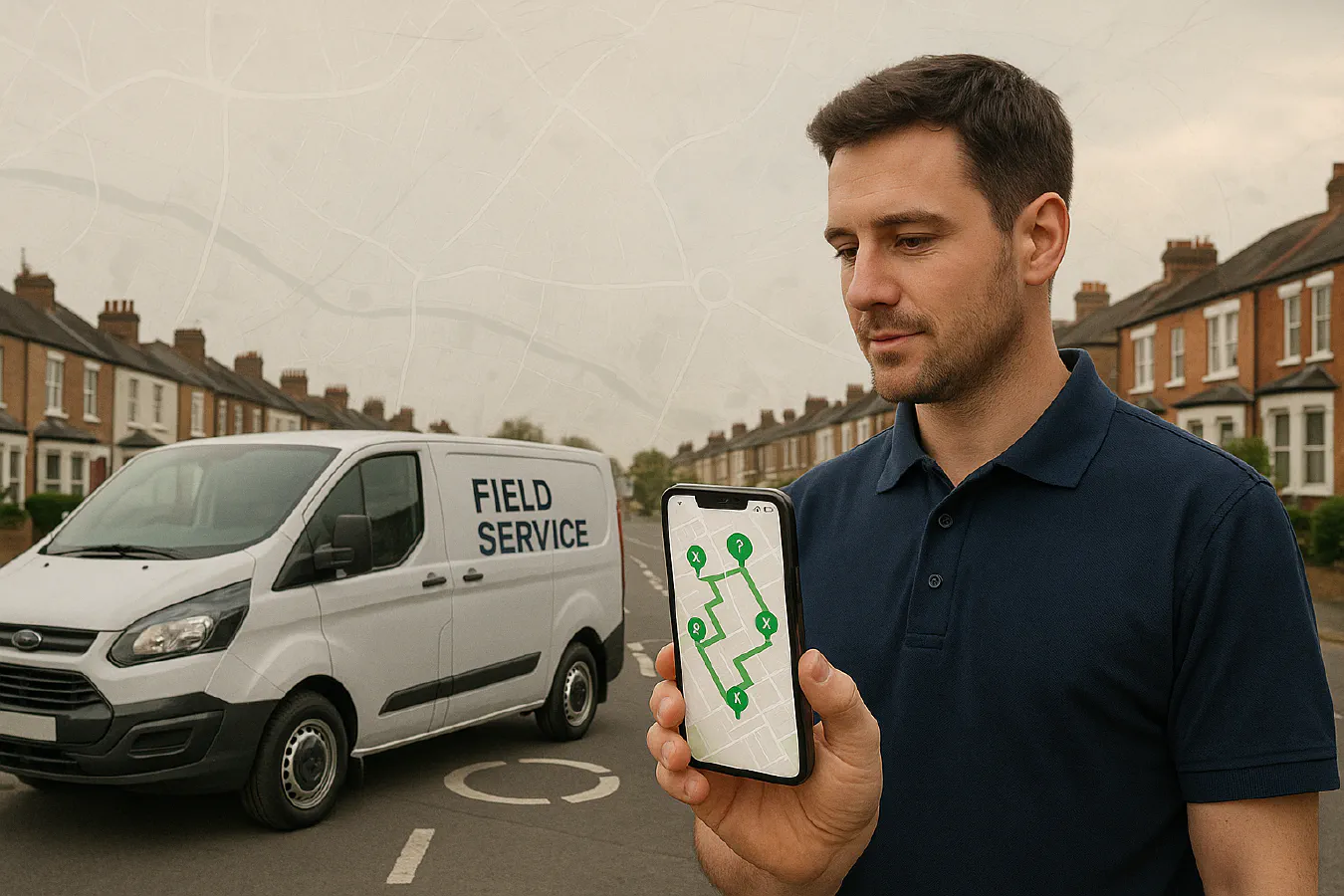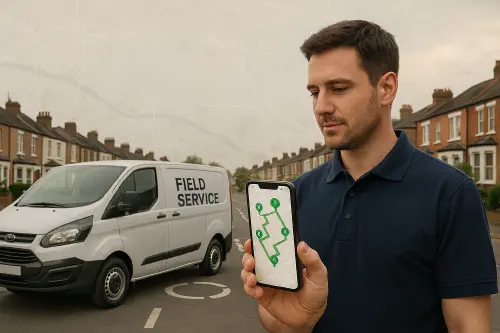
Route planning for trades: simple setup to cut drive time and fit in one extra job per day
Jump To...

Engineer with van using a phone route planner showing an improved multi-stop route in a UK street
Who this is for
Small to mid-size UK trades teams who send 1 to 20 engineers out each day, and want to:
- Spend less time in the van and more time on paid work
- Reduce fuel and overtime
- Lift first-time fix by scheduling nearby jobs sensibly
Works well for plumbing, heating, electrical, carpentry, maintenance and small construction teams.
Quick results in 30 minutes
Aim for a simple win first. In half an hour you can:
- Export today’s booked jobs to a CSV with postcodes and time windows
- Paste into a free multi-stop planner to get an improved order
- Share that list to each engineer’s Google Maps for turn-by-turn
If you do nothing else, this alone often saves 30 to 60 minutes of driving per engineer per day.
Which apps work in the UK
You don’t need enterprise software to get a result. These are commonly used in the UK:
- Google Maps multi-stop: good for up to 10–15 stops. Free. Google Maps
- RouteXL: quick paste-in of postcodes, exports to Maps. Free tier and paid. RouteXL
- OptimoRoute: stronger scheduling and constraints, paid. OptimoRoute
- AA Route Planner: reliable UK routing. Free. AA Route Planner
- Joblogic route scheduling: UK field service system with route improvement. Joblogic
Tip: Use Google Maps or Waze for actual navigation after you’ve decided the stop order.
Set up your daily routing flow
Here’s a simple, copyable routine.
1. Prepare your jobs list
Include:
- Customer name and contact
- Full address with postcode
- Time window or “anytime”
- Job length estimate
- Skills constraint if relevant (e.g., Gas Safe only)
Most job systems let you export a CSV. If not, copy from your calendar.
2. Build the route
- Paste the stops into RouteXL or OptimoRoute.
- Set depot/start location to the engineer’s home or yard.
- Set time windows and job durations.
- Click improve to get the best order.
3. Send to phones
- Export to Google Maps links and share by WhatsApp or inside your job app.
- Add a lunch buffer and a 15-minute “traffic slack” in the afternoon to avoid overruns.
4. Handle changes live
- If a cancellation lands, re-improve the remaining stops.
- Use what3words for hard-to-find sites to reduce faff. what3words
Add AI to pick the best sequence
If you want a bit more intelligence without heavy IT:
- Use a simple spreadsheet with job data and a prompt to ChatGPT or Gemini to suggest an order based on postcodes, time windows, and skills. Then check in RouteXL.
- Many UK FSM tools now include “smart routing.” Trial Joblogic or OptimoRoute and compare results.
What to factor in:
- Traffic by time of day
- Parking difficulty and site access notes
- Known “long jobs” first to avoid late-day slippage
- Group warranty/recall jobs close together
Proof and KPIs to track
Measure for two weeks before and after:
- Average drive time per job
- Jobs per engineer per day
- Fuel cost per job
- First-time fix rate
A common outcome is saving 30–90 minutes of driving per engineer per day, which often fits in one extra small job.

improved route map on phone with van and UK terrace street
Simple flowchart

Daily route planning flow: export jobs → improve → send to phone → drive → update and re-improve if needed
Helpful related reads
- WhatsApp appointment reminders for trades: message templates, Google Calendar setup and a 7-day follow-up plan (reduces no-shows that wreck routes) (https://academy.trainar.ai/whatsapp-appointment-reminders-for-trades-message-templates-google-calendar-setup-and-a-7day-followup-plan)
- ServiceM8 ↔ Google Calendar (UK): fix one-hour shifts, duplicates and missing jobs around BST/GMT (https://academy.trainar.ai/servicem8-google-calendar-uk-fix-onehour-shifts-duplicates-and-missing-jobs-around-bstgmt)
FAQs
How many stops can Google Maps handle well?
Up to 10 on mobile, around 15 on desktop. For more, build the order in RouteXL or OptimoRoute then open in Maps.
Can I do multi-van routing?
Yes, use RouteXL Pro or OptimoRoute to split stops between engineers. Set start locations and skills, then export per person.
What about London traffic and ULEZ?
Run an “inner London” route as its own batch, factor Congestion Charge and parking time. Consider public transport for survey-only visits.
Is this worth it for emergency callouts?
Yes. Keep one “floater” engineer for emergencies and re-improve the rest when a red job lands.
Ready to Transform Your Business?
Turn every engineer into your best engineer and solve recruitment bottlenecks
Join the TrainAR Waitlist